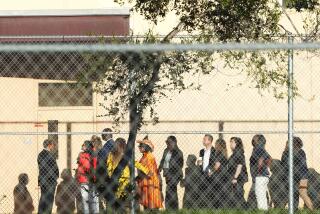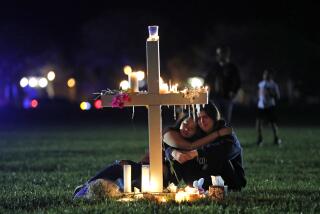Florida Student Killings Trial Due to Begin Today
- Share via
MIAMI — The gruesome serial killings of five college students--crimes that shocked the nation and terrorized a north Florida town three and half years ago--will be revisited beginning today as the murder trial of a rangy Louisiana drifter opens in a Gainesville courtroom.
Danny Harold Rolling, 39, is charged with five counts of murder in the stabbing and mutilation deaths that took place over three days at the beginning of the 1990 fall term at the University of Florida.
The slayings were particularly savage--one of the victims was decapitated, three were sexually assaulted and all were stabbed several times.
The crime scenes--the apartments where the victims lived--were so horrific that the prosecutor has moved to keep police photos of the bodies sealed. “I don’t think the loved ones should ever have to see these photos,” said the chief prosecutor, state attorney Rod Smith.
Rolling, the son of a retired police officer, already is serving a life prison sentence after pleading guilty in 1991 to a grocery store robbery and being sentenced as a career criminal. He has previous robbery convictions and has been linked to several other crimes, including a triple murder in Shreveport, La., and shooting his father in the face.
If Rolling is convicted of the Gainesville slayings, the state will ask that he be executed. “Frankly, in my view, if it is proven that he did these crimes in this fashion, then there is only one appropriate penalty and that’s death,” Smith said.
“This case is stuck in the collective memory of the community.”
Although most of the 36,000 students now enrolled in the largest of Florida’s state universities were not there when the slayings occurred, the killings are an enduring stain. “Students couldn’t avoid hearing and reading about it, and there’s been a lot of media attention leading up to trial,” university spokesman Joseph Kays said. “But it is not something many students dwell on day to day.”
Indeed, perhaps the most indelible reminder of the murders is a police security inspection program for off-campus housing and the 34th Street Wall, where graffiti artists years ago memorialized the victims by spray-painting their names. That section of the wall is never painted over.
The knife used to kill Christina Powell, 17, Sonja Larson, 18, Christa Hoyt, 18, Tracy Paules and Manuel Taboada, both 23, has never been found.
But prosecutors said their case against Rolling is strong and is based chiefly on DNA evidence taken from semen found at the scene and from a jailhouse statement Rolling made to a cellmate.
Cellmate Bobby Lewis provided details of the slayings that only the killer could know, police have said.
Lewis, said to be the only inmate ever to escape from Florida’s Death Row, was in jail at the time of the killings and was never a suspect.
Rolling’s attorney, public defender Rick Parker, refused to comment on defense strategy.
Jury selection is expected to take up to three weeks, and the trial itself could run through April.
More to Read
Sign up for Essential California
The most important California stories and recommendations in your inbox every morning.
You may occasionally receive promotional content from the Los Angeles Times.













